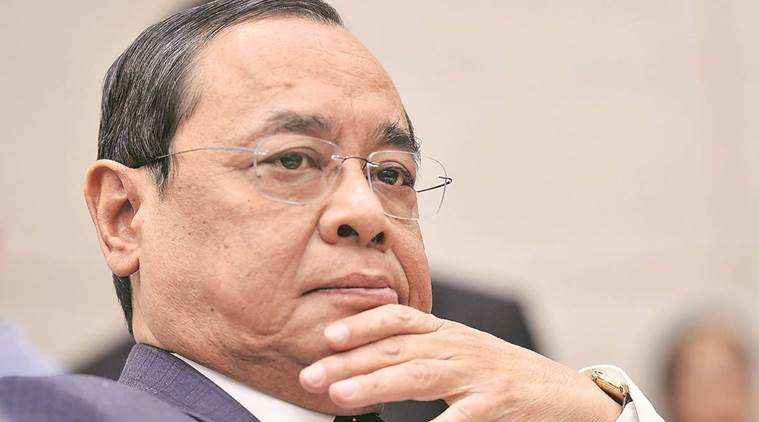Pendency can make the system irrelevant, have a plan: CJI-designate Ranjan Gogoi
Chief Justice of India-designate Ranjan Gogoi Saturday expressed concern over the pendency of cases in courts, saying “it has the potential of making the system irrelevant”.
Speaking at a seminar organised by the Youth Bar Association, Justice Gogoi, who is set to assume office as CJI on October 3, said he had a “plan” to tackle this and “will unfold it”.
Pendency, Justice Gogoi said, “is bringing a lot of disrepute”. So much so that “the accused in a criminal case is getting a hearing after he has served out his sentence”, and “the parties in a civil proceeding are getting their judgments in the second or third generation.”
“I would request each of you to kindly give a thought to this and see how you can overcome this difficulty,” he said. “I don’t think the task is really difficult. I have a plan, will unfold it and you are welcome to take part in that, to participate in the process.”
The CJI designate also touched upon social engineering and the role of young lawyers in it.
Justice Gogoi said he was constructing a house in Assam to go back to after his retirement, and added, “as the architects and engineers are responsible for the good house they are building for me, you as a lawyer and me as the judge, we are responsible for what society is. What we get to see in society every day, what we get to see how human rights, political rights, social rights of the 130 crores of Indians are delivered.”
Speaking on role of the Bar in Social Engineering, he quoted a lecture delivered by the late Supreme Court Justice H R Khanna.
“In ensuring the rule of law, the most significant part is perhaps played by the lawyers. I am not sure whether we give due expression to our gratitude to the legal profession. Judges often shine with reflected glory. A good many of the judgments reveal not so much of the legal vision of the judge as of the counsel who argued the case and assisted the judge by forensic arguments in preparing that judgment,” Justice Gogoi quoted Justice Khanna.
Justice Khanna had in the lecture referred to the US Supreme Court Chief Justice John Marshall for his “great judgment in Marbury v Madison” (which established the principle of judicial review) and said that to prepare this judgment he “had the advantage of the written brief of the great lawyer Daniel Webster”.
“The same we can say of some of our stalwarts who are now no more, of Motilal and Sapru, of Bhulabhai and Jinnah, of Munshi and Krishnaswamy Iyer,” Justice Khanna had said, and added “law it has been said does not live in the books, it lives with the profession. Judges’ tryst with their brief authority may seem to speak more…, but it is only for the moment. In the end, they take their cues from the Bar, for it is the Bar which makes the statutes and fabricates the adjustments which they express. It is also the Bar which gives new shape and meaning to the words of the statute and puts flesh and blood in their dry bones”.
“This”, Justice Gogoi underlined, “is the role of the Bar”. He added, “Judges are what the Bar makes them. Judgments are what the Bar provides.”
The second issue, other than pendency, which was troubling him, Justice Gogoi said, was “providing access to justice to the huge poverty-stricken population of this country”.
He urged young lawyers to “offer voluntary legal service”, which is “actually not voluntary, as under the present scheme of things, voluntary legal service aid is recognised by grant of a small remuneration”. “But I assure you the degree of satisfaction that it can bring to each one of you is tremendous.”
This, Justice Gogoi said, was the social engineering he was speaking of. “This is the social engineering. Not in terms of judgments, not in terms of jurisprudence. We have done well in terms of jurisprudence. Social engineering in providing access to justice, in enabling a person who cannot come to court, to come to the court, and travelling beyond legal aid and expanding the scope of legal service, to giving each man his due under the law without having to come to the court,” he said.


Comments are closed.